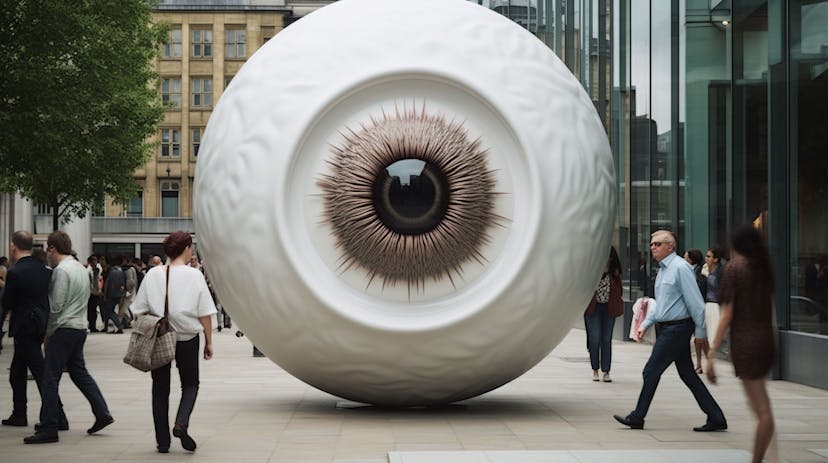
As time marches on, our eyes, much like the rest of our bodies, undergo natural changes. Among these, cataracts emerge as a common age-related condition that can profoundly affect vision. While cataracts often develop gradually, in some cases, they progress to a point where their impact becomes unmistakable. Severe cataracts, characterised by significant clouding of the eye's lens, can lead to a range of discernible symptoms that profoundly influence daily life. In this exploration, we uncover the hallmark signs of advanced cataracts, shedding light on how they manifest and the crucial importance of timely intervention.
Severe Cataract Symptoms
Severe cataracts can lead to a range of noticeable symptoms that significantly impact vision and daily activities. Here are the common symptoms associated with severe cataracts:
- Blurred Vision: Vision becomes increasingly hazy or cloudy, making it difficult to see fine details or read small print.
- Diminished Colour Perception: Colours may appear faded or less vibrant, leading to difficulty distinguishing between different shades.
- Increased Sensitivity to Glare: Bright lights, such as headlights or sunlight, can cause discomfort or even temporary blindness.
- Halos Around Lights: Light sources may appear surrounded by a halo or ring-like effect, particularly in low-light environments.
- Double Vision: Severe cataracts can cause overlapping or multiple images (double vision), making it challenging to focus on a single, clear image.
- Difficulty with Night Vision: Nighttime vision can be particularly affected, leading to poor visibility in low-light conditions.
- Frequent Changes in Prescription Glasses: Individuals with severe cataracts may find that their glasses prescription needs to be adjusted frequently to try and compensate for changing vision.
- Impaired Depth Perception: Judging distances accurately becomes more challenging, which can lead to difficulties with tasks like judging steps or parking a car.
- Difficulty Reading or Performing Close Work: Severe cataracts make it hard to focus on close-up tasks, such as reading, sewing, or using electronic devices.
- Loss of Independence: The combination of multiple symptoms can lead to a loss of independence, making it challenging to perform everyday activities without assistance.
- Reduced Quality of Life: Severe cataracts can limit an individual's ability to engage in social activities, hobbies, or even simple tasks of daily living.
- Frustration and Anxiety: Struggling with vision impairment can lead to feelings of frustration, anxiety, and even depression due to the challenges faced in daily life.
Furthermore, these symptoms can vary in intensity and may progress over time. Recognising these signs and seeking timely intervention through cataract surgery can lead to significant improvements in vision and overall quality of life. Regular eye examinations are crucial for early detection and appropriate management. If you or someone you know is experiencing any of these symptoms, consulting an ophthalmologist is highly recommended.

What Happens To Untreated Cataracts
Untreated cataracts can have a significant impact on an individual's vision and overall quality of life. Here are some of the worst effects of having advanced or untreated cataracts:
Severe Visual Impairment
As cataracts progress, they cause increasing cloudiness in the lens, leading to a significant reduction in visual acuity. This can make it extremely difficult to perform routine tasks, such as reading, driving, or recognising faces.
Blindness
If left untreated for an extended period, cataracts can lead to legal blindness. This can have a profound impact on an individual's independence and ability to navigate the world.
Reduced Quality of Life
Advanced cataracts can limit an individual's ability to engage in activities they once enjoyed, leading to a diminished overall quality of life. Simple tasks like cooking, cleaning, or watching television become challenging.
Increased Risk of Falls and Accidents
Poor vision due to cataracts can lead to a higher risk of accidents, particularly falls. This is especially true in environments with low lighting or uneven surfaces.
Social Isolation
Struggling with vision impairment can lead to social withdrawal. Difficulty recognising faces or reading can make social interactions frustrating and less enjoyable.
Depression and Anxiety
The loss of independence and the challenges of living with severe vision impairment can lead to feelings of depression and anxiety. This can have a cascading effect on mental and emotional well-being.
Impaired Safety
Impaired vision due to cataracts can pose risks in various situations, such as driving. This not only endangers the individual but also others on the road.
Decreased Productivity
For individuals in the workforce, untreated cataracts can lead to decreased productivity and, in some cases, an inability to continue working.
Difficulty with Daily Tasks
Simple, everyday tasks like reading, cooking, and self-care become increasingly challenging and frustrating.
Strain on Relationships
Vision impairment can strain relationships with family, friends, and caregivers. Communication and shared activities become more challenging.
Moreover, modern cataract surgery is highly effective in treating this condition. With timely intervention, the negative effects of cataracts can be significantly mitigated, and in many cases, vision can be restored to a high level of clarity and functionality. Regular eye examinations are crucial for early detection and appropriate management.

The Dangers Are Real If Cataracts Are Neglected
Allowing cataracts to progress untreated can lead to a cascade of potentially devastating consequences. Beyond the obvious vision impairment, there are broader dangers at play. Activities that once brought joy and independence can become perilous endeavours. The risk of accidents, particularly falls, escalates, especially in environments with low or fluctuating lighting. Additionally, the strain on mental and emotional well-being cannot be overstated. Depression and anxiety can take hold as the world grows progressively obscured. Social connections fray, leaving individuals grappling with isolation. It's not merely a matter of compromised sight; it's a tangible threat to the very fabric of daily life. Addressing cataracts promptly is not just a matter of reclaiming vision, but of safeguarding overall well-being.
The Importance Of Early Intervention
Recognising the signs of cataracts early on is crucial for preserving vision and overall well-being. Fortunately, modern cataract surgery has revolutionised the treatment of this condition. It's a safe and highly effective procedure that can significantly improve quality of life. With advancements in surgical techniques and technology, the risks associated with cataract surgery are minimal. The procedure involves removing the cloudy lens and replacing it with a clear artificial lens, allowing for clear vision to be restored.
By seeking early intervention through cataract surgery, individuals can experience a range of benefits. These include:
- Cataract surgery can lead to a remarkable improvement in visual acuity. Colours appear more vibrant, and details become crisp and clear.
- Regaining the ability to perform everyday tasks with ease, such as reading, driving, and engaging in hobbies, can significantly enhance one's overall quality of life.
- With clearer vision, the risk of accidents and falls is reduced, allowing individuals to move confidently through their environment.
- The cataract surgery process empowers individuals to regain their independence, reducing reliance on others for assistance in daily activities.
- The restoration of clear vision often leads to improved mental and emotional well-being, reducing feelings of frustration and anxiety associated with vision impairment.
Remember, regular eye check-ups are key to early detection. If you notice any changes in your vision or suspect the presence of cataracts, don't hesitate to consult an eye care professional. They can provide a thorough evaluation and recommend the most appropriate course of action tailored to your unique needs. Early intervention can make a world of difference in preserving your vision and ensuring a bright and clear future.
Embrace A Brighter Tomorrow With My-iClinic!
Are cataracts casting a shadow on your world? My-iClinic is here to illuminate your path to a clearer vision and a more vibrant life. Our team of seasoned experts is dedicated to providing top-tier care, ensuring you receive the specialised attention you deserve. With cutting-edge technology and a personalised approach, we tailor each treatment to your unique needs. Don't let cataracts dim your days—take the first step towards a brighter tomorrow.
Let's embark on this journey together, towards a life filled with clearer vision and endless possibilities. Contact us today for an appointment.
Find out more by Speaking to our team









